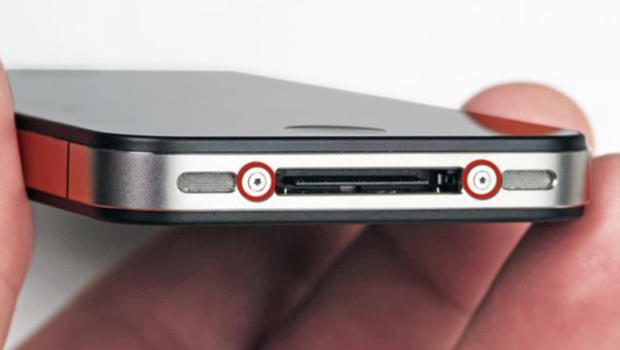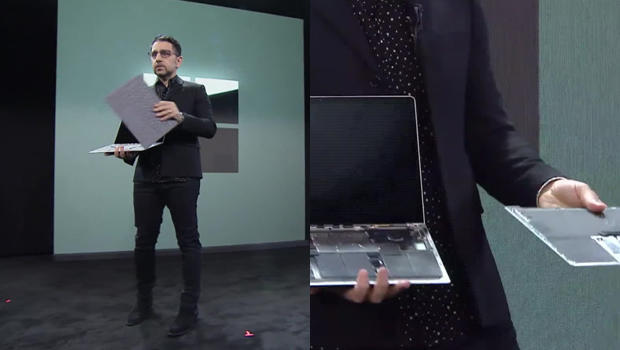Fighting for the right to repair your own stuff
Last summer, fourth-generation California farmer Dave Alford showed correspondent David Pogue around his 2004 John Deere tractor.
"Oh, man, it's like a 747 cockpit over here!" Pogue laughed. "Not your grandfather's tractor!"
But it was this tractor that caused him grief during last year's planting season: "I got in the tractor, and it throws an error code up in that readout," Alford said. "So, I called my dealer. 'Hey, I'm in a bind.' And they're busy and they can't come just like that."
He lost two days of farming time waiting for a repair. He'd much rather have just fixed the thing himself. "In agriculture we're kind of born, raised and bred that we like to fix all of our own stuff," Alford said. "And that's about the only way, especially a small family farmer, can make a living."
"You don't think of a tractor as high-tech as everything else we have," said Kyle Wiens, the founder and CEO of iFixit. "But a tractor has a touchscreen in it; it's got a computer."
iFixit offers tools, parts and repair manuals for thousands of gadgets. Wiens told Pogue, "There is a special screw on the iPhone that Apple put on there just to keep you out. It's a special five-pointed screw that no one had seen before the iPhone."
He said that the big electronics makers try to stop you from fixing your own stuff.
"The manufacturers are cutting off all the things that we need in order to fix things – shortening life spans, and forcing us to go to them to just buy a new one rather than fixing what we already have," said Wiens.
And why are they doing this? "To increase their service revenues," he said. "They wanna make as much money fixing things as possible."
Believe it or not, there was a time when manufacturers advertised how long their products lasted, like Maytag washing machines. But if a 2019 Microsoft laptop model is any indication, those days are over.
Wiens said, "There's absolutely no way to get this thing open without destroying the laptop to replace the battery. This is a disposable product. You use it for two years, you throw it away, you go and buy a new laptop."
But Wiens doesn't just grumble; he's a leader of a national movement called Right to Repair. They want laws that would allow you to fix your own electronics, or at least take them to local independent repair shops, instead of forcing you to use the manufacturer's repair service.
- Proposed laws could change how consumers get smartphones repaired ("CBS This Morning")
At a 2019 hearing for a Massachusetts repair bill, a parade of industry representatives explained their objections. Tia Sutton, of the Truck and Engine Manufacturers Association, said, "Allowing unfettered access to service information to untrained individuals will undermine the integrity of the equipment."
Christina Fisher, then of TechNet, testified, "This legislation has been filed in over 21 states and no state has passed this legislation. And that's for a reason."
And it's true: No state has yet passed a Right-to-Repair law. But the movement hasn't been a total bust.
John Deere said that starting next year it will offer repair manuals and other diagnostic tools for its tractors.
And remember that unrepairable Microsoft laptop? This year's models are not only far more repairable, but Microsoft actually touts their repairability as a desirable feature!
Last year, Apple launched its Independent Repair Provider Program, which offers authentic parts, tools and training to independent repair shops.
It seemed like just what Theresa McDonough had been hoping for. She runs a repair shop in Middlebury, Vermont, a state where there are no Apple stores.
"They were going to release this independent repair program, which I guess allowed for access to parts and manuals for independent repair shops," McDonough said.
But in the end, she didn't sign up for Apple's program. She found the requirements too invasive, too much data collection, and parts prices too high. "Sometimes I wonder if it's a PR stunt more than it is actually helpful," she said.
In the meantime, Kyle Wiens said, the fight will go on: "So, this is a groundswell of people across the country saying, 'No, enough is enough. We're sick of throwing away things that are almost functional. Let's take the leap, let's fix them, and let's push back on this throwaway culture.'"
For more info:
- Right to Repair (repair.org)
- Right to Repair: Take Action (U.S. Public Interest Research Group)
- iFixit
- Tech Medic, Middlebury, Vt.
Story produced by Anthony Laudato. Editor: Mike Levine.





